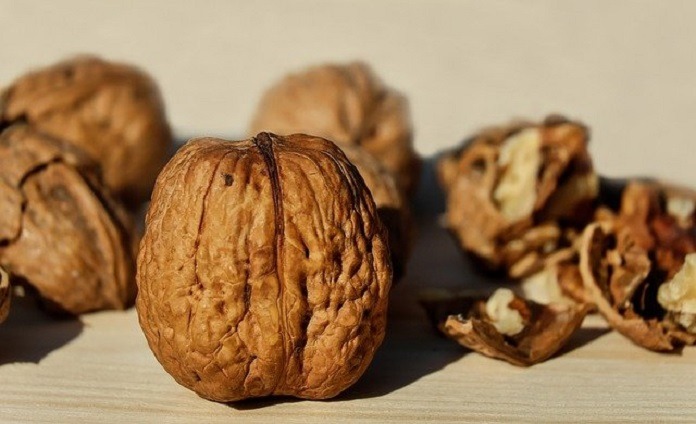Eating a handful of walnuts each day may promote cardiovascular health and reduce cardiovascular disease risk, according to a new study.
Cardiovascular disease (CVD) is the leading cause of morbidity and mortality worldwide. Low-density lipoprotein (LDL) cholesterol is known as “bad” cholesterol since high levels significantly increase the risk of heart disease and strokes. A healthy diet and nutrient-dense foods (such as unsalted nuts and seeds) are recommended to reduce the risk of chronic diseases.1
Walnuts are made up of fats, proteins, and dietary fiber. Walnuts are a rich source of omega-3 fatty acids and α-linolenic acid, which are very important for cardiovascular health. According to the American Heart Association, walnuts are a healthy choice to increase dietary omega-3 fatty acids, the same heart-healthy fat found in oily fish. Frequent consumption of nuts is associated with a reduction of cardiovascular disease by 15% and CVD mortality rates by 23%.
Adding walnuts to the diet decreases cardiovascular disease risk
Research published in Circulation2 used results from the Walnuts and Healthy Aging (WAHA) study to investigate the effect of adding walnuts into the diet on lipid profile. A lipid profile investigates abnormalities in lipids, such as cholesterol and triglycerides, using blood tests.
Participants were healthy and elderly (between the ages of 63 and 79). 708 participants were randomly assigned to either the control (walnut-free) or walnut-supplemented diet group. The intervention group had to add a half-cup of walnuts to their daily diet. 632 participants completed the 2-year study, at which point their cholesterol levels were tested and their lipid profiles were analyzed using nuclear magnetic resonance (NMR) spectroscopy.
The results of the study showed that eating a half-cup of walnuts daily for 2 years:
- Reduced levels of LDL cholesterol
- Reduced the number of total LDL particles by 4.3%
- Reduced the number of small LDL particles by 6.1%
Co-author Dr Emilio Ros stated, “Prior studies have shown that nuts in general, and walnuts in particular, are associated with lower rates of heart disease and stroke. One of the reasons is that they lower LDL-cholesterol levels, and now we have another reason: they improve the quality of LDL particles.”3
LDL particles are byproducts of fat transport that can remain in circulation for a long time. Dr Ros explained, “LDL particles come in various sizes. Research has shown that small, dense LDL particles are more often associated with atherosclerosis, the plaque or fatty deposits that build up in the arteries. Our study goes beyond LDL cholesterol levels to get a complete picture of all of the lipoproteins and the impact of eating walnuts daily on their potential to improve cardiovascular risk.”
At 2 years, participants in the intervention group showed reductions in LDL cholesterol levels of 4.3 mg/dL and total cholesterol of 8.5 mg/dL. Changes in LDL particle concentration and composition are associated with a lower risk of cardiovascular disease.
Dr Ros clarified, “While this is not a tremendous decrease in LDL cholesterol, it’s important to note that at the start of the study all our participants were quite healthy, free of major non-communicable diseases. However, as expected in an elderly population, close to 50% of participants were being treated for both high blood pressure and hypercholesterolemia (elevated levels of LDL cholesterol). Thanks in part to statin treatment in 32%, the average cholesterol levels of all the people in our study were normal. For individuals with high blood cholesterol levels, the LDL cholesterol reduction after a nut-enriched diet may be much greater.”
Additional findings from the study include:
- A reduction in Intermediate Density Lipoprotein (IDL) cholesterol (a precursor to LDL)
- A reduction in LDL cholesterol by 7.9% in men and 2.6% in women
- No unwanted weight gain in the participants despite walnuts being high in calories
The key point to take away from this study is summarized by Dr Ros: “Eating a handful of walnuts every day is a simple way to promote cardiovascular health.”
References:
1. Kris-Etherton P. (2014). Walnuts decrease risk of cardiovascular disease: a summary of efficacy and biologic mechanisms. The Journal of Nutrition, 144(4), 547-554. Retrieved from: https://academic.oup.com/jn/article/144/4/547S/4571627
2. Rajaram S, et al. (2021). Effects of walnut consumption for 2 years on lipoprotein subclasses among healthy elders: findings from the WAHA randomized controlled trial. Circulation. Retrieved from: https://www.ahajournals.org/doi/10.1161/CIRCULATIONAHA.121.054051
3. Eating walnuts daily lowered bad cholesterol and may reduce cardiovascular disease risk (2021). EurekAlert! Retrieved from: https://www.eurekalert.org/news-releases/926438
Image by Couleur from Pixabay



